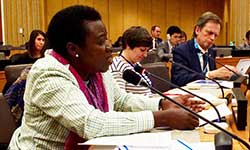Rose Kiwanuka RN, Country Director of the Palliative Care Association of Uganda returns to Kampala this weekend after participating in a meeting on the World Drug Problem convened by the President of the UN General Assembly Mr. Mogens Lykketoft. UN Secretary General Ban Ki Moon also presided at the meeting.
The purpose of the interactive consultation with global civil society representatives was to provide an opportunity to advise member states in preparation for the UN General Assembly Special Session on the World Drug Problem (UNGASS) to be held in April, 2016.
Uganda is now seated on the UN Commission on Narcotic Drugs in Vienna, and can share its experience in relieving the suffering of its citizens through rational use of morphine, an essential medicine controlled under the international drug treaties.
The UN consultation on February 10, provided stakeholders with an opportunity to contribute to the ongoing preparatory process in a day of interactive panel discussions with member states, representatives from civil society, and the academic and scientific communities.
The consultation assessed various aspects of drug policy and practice, underscoring best practices on the ground.
Uganda has long been an African leader in the provision of hospice, palliative care, and pain relief thanks to the leadership of Hospice Africa Uganda, home of The Institute for Hospice and Palliative Care in Africa (IHPCA), whose mission is to train health professionals to relieve pain and suffering caused by HIV/AIDS, cancer, and other non-communicable diseases.
Uganda has taken a lead role in the world by allowing trained and licensed nurses to prescribe oral morphine for patients suffering at home.
Morphine is a controlled medicine, the “gold standard of pain control,” according to the World Health Organization, yet unavailable in more than 80% of the world.
At the UN meeting, Ms. Rose Kiwanuka said:“Pain is the enemy of man, and nothing gives us nurses more joy than to see the relief on a patient’s face after receiving a dose of morphine and being able to finally sleep through the night. Families who have cared for loved ones also suffer the secondary trauma of witnessing their agonizing pain, and experience deep relief when they are provided with palliative care.”
Ms. Rose Kiwanuka als told the assembled delegates that Africa is the continent with more deaths in pain — 43% — than any other region in the world because we are starved of opioids.
“I am here to urge the African delegates at UNGASS to call for a new approach to access to controlled medicine. African countries can avoid duplicating the profound failures that characterize world drug policy today, and can take the lead on showing the world how to relieve suffering by making controlled medicines rationally available where they are most needed. We need to teach our medical professionals, our narcotics police, our drug regulators, and our politicians that morphine is an essential medicine, not a bad addictive drug,” she said.

